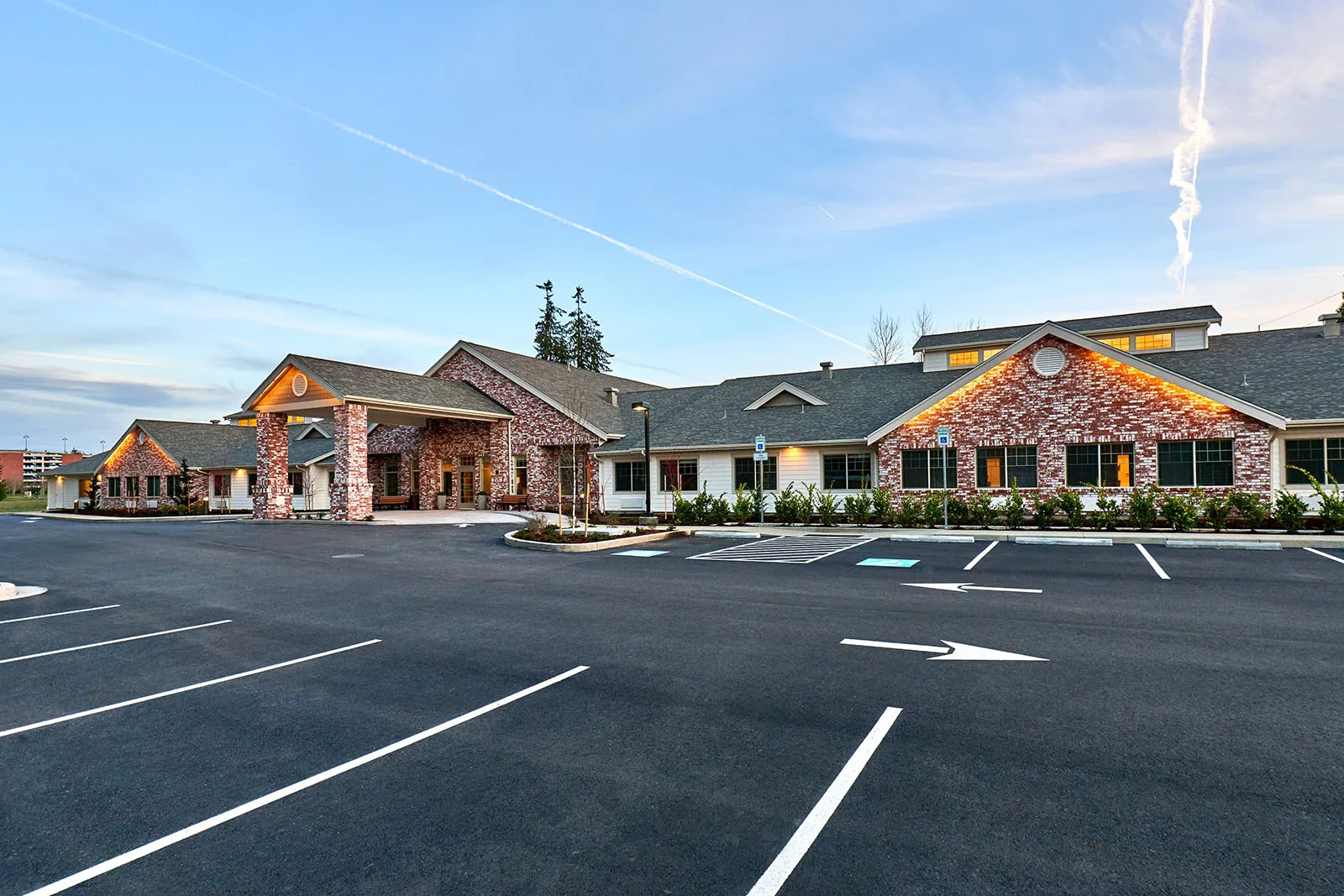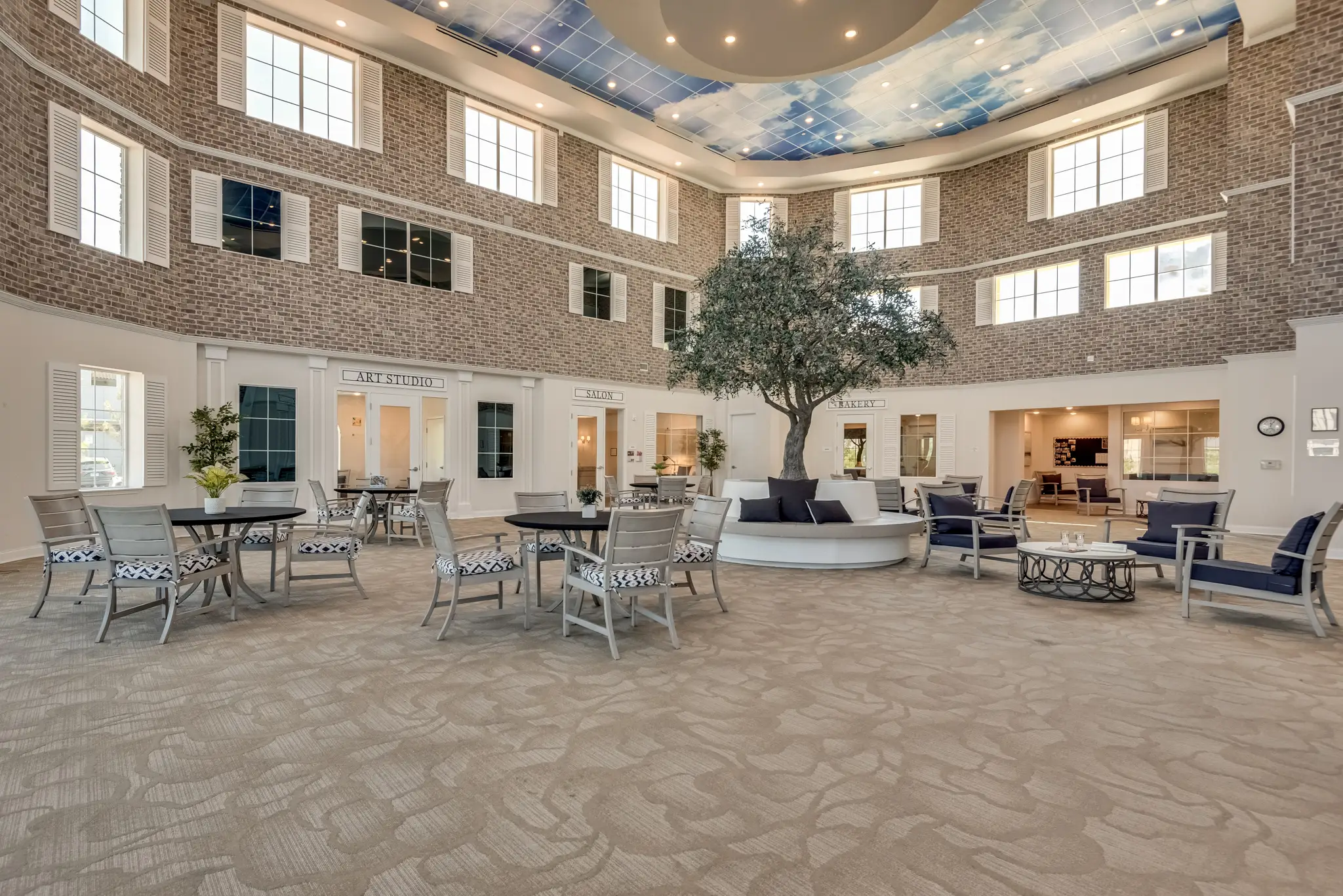Understanding Memory Care: A Comprehensive Guide

What is memory care? Memory care is a specialized type of senior living designed to support individuals living with Alzheimer’s disease, dementia, or other forms of memory loss. Unlike general assisted living, memory care communities provide a secure environment, structured routines, and staff trained specifically in dementia care.
If you’re beginning to explore care options for a loved one living with Alzheimer’s disease or another form of dementia, you may be wondering: What is memory care? A memory care facility—sometimes called a memory home or dementia unit—is a specialized residential community designed to meet the unique needs of individuals experiencing memory loss. These environments offer around-the-clock supervision, tailored activities, and staff who are specially trained to support cognitive decline with compassion and structure.
Unlike traditional senior living or assisted living settings, memory care facilities are intentionally built to reduce confusion, increase safety, and foster a sense of comfort and familiarity. Residents benefit from structured routines, personalized care plans, therapeutic programming, and enhanced security features that help minimize risks associated with wandering and disorientation.
In this comprehensive guide, we’ll help you understand what memory care is, what services are typically offered, and how it differs from other types of senior care. We’ll also explore who may benefit from memory care, what to look for in a high-quality community, and what families can expect when transitioning a loved one into a more supportive setting.
Whether you’re just starting your search or seeking clarity on what type of care best fits your loved one’s needs, this article will give you the insight you need to make informed decisions about memory care and the specialized support it provides.
Key Points to Consider
The early symptoms of Alzheimer’s disease and other forms of dementia can be subtle and are often mistaken for the natural aging process. During these initial stages, families may not immediately consider the need for a memory care facility. However, as symptoms progress—such as increased confusion, wandering, and sleep disturbances—providing care at home can become increasingly difficult and even unsafe. These challenges may indicate it’s time to explore more structured support.
When dementia-related symptoms reach a point where they significantly impact daily functioning or create safety risks, a specialized memory care setting may offer the best solution. In these communities—sometimes referred to as memory homes or dementia units—individuals receive tailored care, therapeutic engagement, and 24-hour supervision in a secure and supportive environment.
Specialized Memory Care
Memory care facilities are specifically designed for individuals living with Alzheimer’s disease and other forms of dementia. These communities offer secure layouts, trained staff, and care plans that address the cognitive, emotional, and physical challenges of memory loss.
Eligibility Requirements
To qualify for memory care, a formal diagnosis of Alzheimer’s or another type of dementia is typically required. Most memory care communities also require that residents need round-the-clock supervision or support with daily activities due to cognitive decline.
Tailored Activities and Programs
Unlike general assisted living, memory care facilities provide dementia-specific programs such as music therapy, sensory stimulation, art projects, gardening, and physical activities. These experiences are carefully designed to support brain function, reduce agitation, and create meaningful moments for residents.
Cost Considerations
The cost of memory care can vary widely, but it's often higher than other senior living options due to the level of specialized care. Many families use a combination of private savings, long-term care insurance, Veterans benefits, or Medicaid (when available) to help cover costs. It’s important to understand what services are included in the monthly rate and whether pricing is all-inclusive.
Early Symptoms and Timing
In the early stages, symptoms like forgetfulness or mood changes may be mistaken for normal aging. However, behaviors such as wandering, increased confusion, or difficulty with basic tasks often signal the need for professional support. Recognizing these signs early can help families make proactive decisions about care before a crisis occurs.
When dementia symptoms become difficult to manage at home, transitioning to a memory care facility can offer peace of mind and a better quality of life for everyone involved. These communities are designed to provide safety, structure, and compassionate support—ensuring your loved one receives the personalized care they deserve.
Memory Care Overview
Memory care facilities provide specialized residential care for individuals with Alzheimer’s disease and other forms of dementia. These communities—sometimes called memory homes or dementia units—are designed to offer a secure, engaging, and structured environment where individuals with memory loss can thrive. With dementia-trained staff, tailored programming, and built-in safety features, memory care helps residents maintain dignity, purpose, and connection.
To learn more about how memory care differs from other senior living options, check out our blog: Memory Care vs. Dementia Care: Understanding the Difference
Key Services Offered in Memory Care Facilities
Residential Care
Most memory care communities offer private or shared apartments, along with three daily meals, snacks, laundry, housekeeping, and assistance with activities of daily living (ADLs).
Specialized Care
Residents benefit from dementia-focused services such as cognitive therapy, structured routines, and secure environments with features like alarmed doors and enclosed outdoor spaces to prevent wandering.
Professional Staff
Care teams are trained in memory care best practices, including how to support dementia-related behaviors with empathy, redirect agitation, and prevent neglect or abuse.
Therapeutic Activities
Programs like reminiscence therapy, art, music, and exercise help promote cognitive stimulation and emotional well-being while reducing anxiety and isolation.
Read: When Should One Consider Transitioning from General Dementia Care to a Memory Care Facility?
Benefits of Memory Care
Secure Environment
Memory care facilities are designed for safety, offering secure entrances and exits, wander protection, and 24/7 supervision to ensure residents remain safe and supported.
Social Engagement
Daily activities encourage interaction, movement, and mental engagement—helping slow cognitive decline and promoting emotional wellness.
Personalized Care
Each resident receives an individualized care plan, including medication management, nutritional support, and personal care tailored to their unique cognitive and physical needs.
Access to Healthcare Professionals
Many communities provide on-site or scheduled access to physical therapists, psychiatrists, nurse practitioners, and other healthcare specialists.
Specialized Staff Training
Team members undergo ongoing training in Alzheimer’s and dementia care, ensuring they understand how to respond to changing needs and behaviors with compassion and expertise.
When to Consider Memory Care
Signs it may be time for memory care include frequent confusion, wandering, disrupted sleep, safety concerns, or increasing physical and emotional strain on caregivers. A formal dementia diagnosis from a healthcare provider is typically required to qualify for residency.
Choosing a Memory Care Facility
When evaluating options, it’s important to assess both the environment and the level of care:
Facility Layout and Environment
Look for clean, calm, and well-lit spaces that are secure yet comfortable. Simple layouts and visual cues help residents navigate more independently.
Staff Training and Expertise
Ask about dementia-specific certifications, staff-to-resident ratios, and protocols for handling behavioral challenges.
Activities and Social Engagement
A strong life enrichment program should offer a variety of activities tailored to residents’ cognitive abilities and interests.
Continuing Care
Understand how the community supports residents whose needs increase over time. Some facilities offer aging-in-place options, while others may require a move if higher care is needed.
Cost and Payment for Memory Care
The cost of memory care can vary widely based on location, services, and amenities. Fortunately, there are several payment options to consider:
Personal Assets and Savings
Families often use Social Security benefits, pension income, or proceeds from the sale of a home or investments.
Government Programs
Medicaid may cover some or all memory care costs for eligible individuals. Medicare can help with certain medical services but does not typically cover room and board.
Long-Term Care Insurance
Policies can reimburse families for memory care expenses, but benefits and waiting periods vary by provider.
Veterans Benefits
Veterans and their surviving spouses may qualify for Aid & Attendance, a VA benefit that helps offset the cost of memory care.
For a full breakdown, visit our blog: How to Pay for Memory Care: A Guide for Families Navigating Senior Care Costs
Alternatives to Memory Care
If memory care is not financially feasible or not yet needed, there are alternative options available to support your loved one and ease caregiver stress:
In-Home Care
Caregivers or home health aides can help with daily tasks, supervision, and companionship within the person’s home.
Adult Day Centers
These programs provide daytime supervision, meals, and dementia-friendly activities in a structured group setting.
Respite Care
Short-term stays at memory care facilities offer temporary relief for caregivers while providing residents with professional care.
Support Groups
Both in-person and online support groups help caregivers and families cope with the emotional and practical challenges of dementia care.
To dive deeper, check out our blog: What is Memory Care? What Families Need to Know
Bottom Line
Choosing the right care for a loved one living with Alzheimer’s or dementia is one of the most important decisions a family can make. Memory care facilities play a vital role by offering a secure environment, personalized support, and staff specially trained in the complexities of memory loss. Whether your loved one is in the early stages of dementia or needs around-the-clock supervision, specialized memory care provides the structure, safety, and compassion they deserve.
When exploring memory care options, consider the individual’s needs, preferences, and stage of cognitive decline. Look closely at the services offered, the expertise of the care team, and the environment of each community. Understanding the costs involved—and what financial resources are available—can also help families make confident, informed decisions.
At ONELIFE Senior Living, we know how overwhelming this journey can be. That’s why we’re committed to walking alongside families every step of the way. Our dedicated team is here to answer your questions, provide guidance, and help you find the right care solution tailored to your loved one’s unique needs.
Contact us today at www.onelifeseniorliving.com or visit one of our communities to learn more about our memory care communities and how we can support you. Let us be your partner in navigating this important transition with clarity, compassion, and care.
Explore ONELIFE Communities Across the Country
ONELIFE Senior Living is proud to serve families in multiple regions, offering exceptional care and support tailored to each resident’s needs. In Springfield, Oregon, The Esther at Riverbend Assisted Living provides personalized assisted living services, while The Rawlin at Riverbend Memory Care specializes in compassionate Alzheimer’s and dementia care. Families in Salem can find trusted support at Battle Creek Memory Care, and those in Beaverton benefit from the warm, secure environment at Waterhouse Ridge Memory Care.
For families in Nevada, Vineyard Henderson Memory Care offers expert dementia care in the heart of Henderson, while in California, The Reserve at Fountaingrove Memory Care provides high-quality memory support in Santa Rosa, and The Woodlake Senior Living serves Sacramento with a full spectrum of senior living options. In Cottage Grove, Oregon, Middlefield Oaks Senior Living combines independence and care, while in the Midwest, The Laurel at Vernon Hills Memory Care stands as a dedicated resource for families in Vernon Hills, Illinois. Finally, in Phoenix, Arizona, Shadow Mountain Memory Care delivers compassionate, all-inclusive memory care in a safe and engaging setting.
No matter which location you choose, every ONELIFE community is united by the same mission: providing exceptional care, meaningful activities, and a true sense of family for residents and loved ones.
Memory Care in Phoenix, Salem, Springfield, Beaverton, Cottage Grove, San Jose, Santa Rosa, Sacramento, Vernon Hills, and Henderson
Choosing the right memory care facility for your loved one is a crucial decision. By understanding what memory care entails and considering the factors that make a great memory care community, you can ensure your loved one receives the best possible care. At ONELIFE Senior Living, we are here to support you every step of the way.
ONELIFE Senior Living offers exceptional memory care facilities in various locations throughout the country, including:
Phoenix, Arizona
Shadow Mountain Memory Care
Salem, Oregon
Battle Creek Memory Care
Springfield, Oregon
The Rawlin at Riverbend Memory Care
Beaverton, Oregon
Waterhouse Ridge Memory Care
Cottage Grove, Oregon
Middlefield Oaks Senior Living
San Jose, California
Sonnet Hill Senior Living
Santa Rosa, California
The Reserve at Fountaingrove Memory Care
Vernon Hills, Illinois
The Laurel at Vernon Hills Memory Care
Henderson, Nevada
Vineyard Henderson Memory Care
Sacramento, California
The Woodlake Senior Living
Our communities are dedicated to providing a supportive and enriching environment for residents with memory loss. With personalized care plans, engaging activities, and compassionate staff, we strive to make our memory care communities a place where residents feel at home. Contact us today to learn more about our memory care facilities, and let us help you find the perfect home for your loved one.
Frequently Asked Questions About Memory Care
What is memory care?
Memory care is a type of long-term residential care designed specifically for individuals living with Alzheimer’s disease, dementia, or other cognitive impairments. Memory care facilities provide 24/7 supervision, structured daily routines, dementia-trained staff, and a secure environment to support safety, well-being, and quality of life.
How is memory care different from assisted living?
While both offer support with daily tasks, memory care provides more intensive supervision and is specifically designed for those with memory-related conditions. Memory care communities offer secure layouts, staff trained in dementia care, and specialized programming tailored to cognitive health—features typically not available in standard assisted living.
When should someone move to memory care?
It may be time to consider memory care when symptoms of dementia begin to compromise safety, independence, or quality of life. Common signs include frequent confusion, wandering, disorientation, sleep disturbances, or caregiver burnout. A formal dementia diagnosis is usually required for admission to a memory care facility.
What services do memory care facilities provide?
Memory care facilities offer private or shared apartments, meals, medication management, personal care, housekeeping, and laundry. They also provide structured activities such as music therapy, exercise programs, sensory engagement, and social events—all designed to support residents’ cognitive and emotional needs.
How much does memory care cost?
The cost of memory care can vary based on location, amenities, and level of care needed. On average, monthly costs can range from $4,000 to over $7,000. Families often use a combination of personal savings, long-term care insurance, Veterans benefits, and Medicaid (if eligible) to help pay for care.
Does insurance cover memory care?
Medicare generally does not cover room and board in memory care facilities, though it may cover certain medical services. Medicaid may cover memory care costs for eligible individuals, depending on state programs. Long-term care insurance policies often include benefits that help pay for memory care.
Contact us
learn more about our
community

More Articles & Resources
EXPLORE THE ONELIFE COMMUNITIES




















